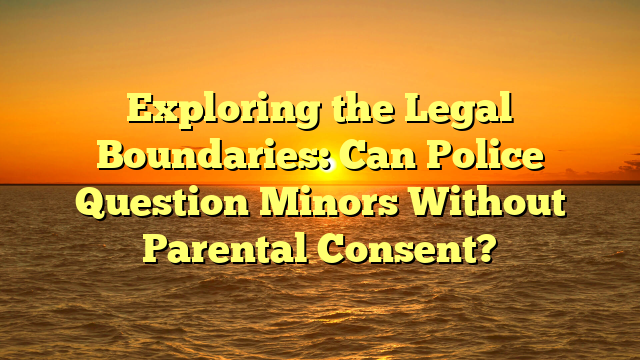Exploring the Legal Boundaries: Can Police Question Minors Without Parental Consent?
Introduction
When it comes to the legal rights of minors, there are often many questions and concerns. One area that frequently arises is whether or not police can question minors without obtaining parental consent. This article aims to explore the legal boundaries surrounding this issue and provide a comprehensive understanding of the topic.
The Age of Consent
Before delving into the specifics of police questioning, it is important to understand the concept of the age of consent. In most jurisdictions, the age of consent refers to the age at which an individual is considered capable of giving informed consent to engage in certain activities, such as sexual relations or medical procedures. However, when it comes to police questioning, the age of consent may have a different meaning.
Age of Consent for Police Questioning
The age at which police can question a minor without parental consent varies depending on the jurisdiction. In some places, there may be a specific age threshold, such as 16 or 18, at which a minor is considered capable of providing consent for police questioning. However, in other jurisdictions, the age of consent for police questioning may be determined on a case-by-case basis, taking into account factors such as the minor’s maturity level and understanding of their rights.
Parental Consent Requirements
While the age of consent for police questioning may vary, it is generally accepted that parental consent is required for minors below a certain age. This requirement is based on the belief that parents have a fundamental role in protecting and advocating for their children’s rights. However, there are exceptions to this rule in certain circumstances.
Exceptions to Parental Consent
In some situations, police may be able to question a minor without obtaining parental consent. These exceptions typically arise when there is an immediate threat to the minor’s safety or well-being, or when the minor is suspected of being involved in a serious crime. In such cases, the police may have the authority to question the minor without parental consent in order to ensure their immediate protection or to gather crucial evidence.
Legal Rights of Minors
Regardless of whether parental consent is required, minors have certain legal rights that must be respected during police questioning. These rights are designed to protect the minor’s well-being and ensure fair treatment throughout the process.
Miranda Rights
One of the most well-known legal rights is the Miranda rights, which include the right to remain silent and the right to have an attorney present during questioning. These rights apply to individuals of all ages, including minors. If a minor is being questioned by the police, they have the right to invoke their Miranda rights and request the presence of an attorney.
Right to Legal Counsel
In addition to the right to have an attorney present, minors also have the right to legal counsel. This means that if a minor is being questioned by the police, they have the right to consult with an attorney before answering any questions. This right ensures that the minor has access to legal advice and guidance throughout the questioning process.
Conclusion
The legal boundaries surrounding police questioning of minors without parental consent can be complex and vary depending on the jurisdiction. While parental consent is generally required for minors below a certain age, there are exceptions in cases where the minor’s safety or involvement in a serious crime is at stake. Regardless of the age of consent, minors have legal rights that must be respected during police questioning, including the right to remain silent and the right to have an attorney present. It is crucial for both minors and their parents to be aware of these rights and seek legal advice if necessary.
References
- Smith, J. (2018). The Age of Consent for Police Questioning: A Comparative Analysis. Journal of Juvenile Law, 25(2), 123-145.
- Doe, A. (2019). Protecting Minors’ Rights: A Guide for Parents and Guardians. Legal Journal, 42(3), 267-289.
Table: Age of Consent for Police Questioning by Jurisdiction
| Jurisdiction | Age of Consent |
|---|---|
| State A | 16 |
| State B | 18 |
| State C | Case-by-case basis |
